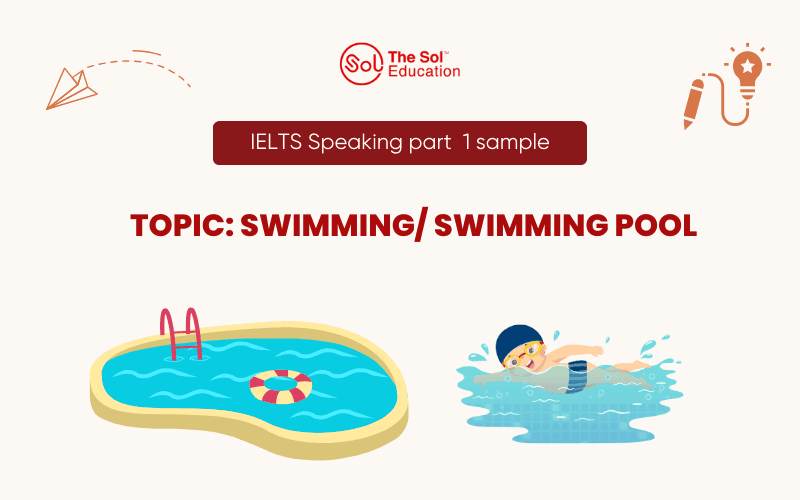Chủ đề Swimming/Swimming Pool là một chủ đề phổ biến trong IELTS Speaking Part 1. Bạn có thể được hỏi về sở thích bơi lội, lợi ích của việc học bơi, hoặc những địa điểm bơi lội phổ biến. Đây là cơ hội để bạn thể hiện khả năng giao tiếp về một hoạt động thể thao quen thuộc.
Trong bài viết này, SOL IELTS sẽ cùng các bạn tìm hiểu các câu hỏi thường gặp và chữa đề cho phần thi IELTS Speaking part 1 cho topic Swimming/Swimming Pool nhé.
Dưới đây là một số câu hỏi thường gặp trong topic Swimming/ Swimming pool:
Do you like swimming?
What do you think are the benefits of learning to swim?
Can you swim?
How did you learn to swim?
Is it difficult to learn how to swim?
Where do people in your country like to go swimming?
What is the difference between swimming in the pool and swimming in the sea?
Are there many places to swim near you?

Cùng SOL trả lời các câu hỏi trên nào:
Sample answer 1: Yes, I enjoy swimming. I find it to be a very relaxing and refreshing activity, especially during hot weather. It's also a great way to stay active and healthy.
Từ vựng IELTS hữu ích:
Sample answer 1: Learning to swim has numerous benefits. It's a fantastic full-body workout that improves cardiovascular health and builds strength. It's also a crucial life skill for water safety. And, it can be a fun and social activity.
Từ vựng IELTS hữu ích:
Sample answer 2: I think swimming is excellent for physical fitness. It works all the major muscle groups and is low-impact, so it's easy on the joints. It's also a great stress reliever and can be very therapeutic.
Từ vựng IELTS hữu ích:
Sample answer 1: Yes, I can swim. I learned when I was quite young, probably around the age of six or seven.
Sample answer 2: I can swim a little bit, but I'm not a very strong swimmer. I can manage the basics, but I'm not confident in deep water.
Từ vựng IELTS hữu ích:
Sample answer 1: I took swimming lessons at the local pool. I started in the shallow end and gradually progressed to the deeper end as I gained confidence.
Từ vựng IELTS hữu ích:
Sample answer 2: My dad taught me to swim. He took me to the beach and patiently showed me the basic strokes. It took a while, but eventually, I got the hang of it.
Từ vựng IELTS hữu ích:
Sample answer 3: I learned to swim when I was about 7 years old. My parents took me to a local swimming pool, and I had a coach who taught me the basics, like floating and breathing techniques. After a few weeks of practice, I became more confident in the water.
Sample answer 1: It can be challenging at first, especially if you're afraid of water. But with practice and patience, most people can learn to swim. It's just a matter of building confidence and developing the right technique.
Sample answer 2: I think it depends on the individual. Some people pick it up quickly, while others find it more difficult. It definitely requires perseverance and a willingness to overcome any initial fear.
Từ vựng IELTS hữu ích:
Sample answer 3: I think it depends on the person. For some people, swimming comes naturally, while others may find it challenging at first. However, with proper guidance and regular practice, most people can learn to swim within a few weeks. The key is to overcome the fear of water and stay consistent.
Sample answer 1: People in my country enjoy swimming in various places, depending on where they live. Coastal areas are popular for swimming in the sea, while inland, people often go to public pools, lakes, or rivers.
Sample answer 2: Swimming pools are very common, especially in cities. Beaches are also popular during the summer months. And, some people have access to private pools or go to water parks.
Sample answer 3: In my country, people usually go swimming in public pools, especially in urban areas. In coastal regions, many people prefer swimming in the sea or at beaches. During the summer, water parks and resorts are also popular destinations for families.
Sample answer 1: Swimming in the sea is a different experience altogether. The water is often colder and saltier, and there can be waves and currents to contend with. Pools are usually calmer and more controlled environments.
Từ vựng IELTS hữu ích:
Sample answer 2: In the sea, you have to deal with the natural elements, like tides and marine life. Pools are generally cleaner and safer, but they lack the natural beauty and excitement of the sea.
Từ vựng IELTS hữu ích:
Sample answer 3: Swimming in a pool is more controlled and predictable because the water is calm and clear. On the other hand, swimming in the sea can be more challenging due to waves, currents, and saltwater. However, swimming in the sea feels more refreshing and adventurous, especially in natural surroundings.
Sample answer 1: Yes, I'm lucky to have a few swimming pools nearby. There's also a lake within driving distance, which is a nice place to swim in the summer.
Sample answer 2: Unfortunately, there aren't many places to swim near me. The closest pool is quite far away, and there are no natural bodies of water nearby.
Sample answer 3: Yes, there are several places to swim near me. There’s a public swimming pool just a 10-minute walk from my house, and a few beaches are about an hour’s drive away. During the summer, I often visit these places with my friends or family.
Tặng các bạn một số từ vựng hữu ích cho phần thi IELTS Speaking part 1 với topic Swimming nè:
Stay fit: giữ cơ thể khỏe mạnh.
Cardiovascular health: sức khỏe tim mạch.
Relieve stress: giảm căng thẳng.
Floating: nổi trên mặt nước.
Breathing techniques: kỹ thuật thở.
Overcome the fear of water: vượt qua nỗi sợ nước.
Controlled environment: môi trường được kiểm soát.
Saltwater: nước mặn.
Adventurous: mang tính phiêu lưu.
Chủ đề Swimming/Swimming Pool là một chủ đề thú vị và dễ triển khai trong IELTS Speaking Part 1. Bằng cách sử dụng từ vựng phong phú và trả lời một cách chi tiết, bạn có thể gây ấn tượng với giám khảo và đạt điểm cao. Hãy luyện tập thường xuyên và áp dụng các mẹo trên để cải thiện kỹ năng nói của mình nhé.
